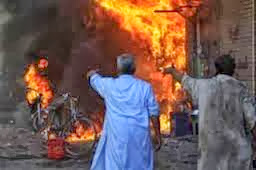
PULI ALAM, (AFP) – A bomb hidden in a
microphone killed an Afghan provincial
governor Tuesday as he made a speech
at a mosque after Eid prayers in Logar,
close to the capital Kabul, officials said.
And in Iraq a bomb ripped through a
crowd of worshippers Tuesday as they
left a mosque in Iraq after prayers
marking the Muslim Eid al-Adha holiday,
killing 11 people, police and a doctor
said.
“This morning, governor Arsala Jamal
was delivering a speech after Eid
prayers when he was killed by a bomb
planted in the microphone,” Logar
provincial governor spokesman Din
Mohammad Darwish told AFP.
“Eight other people have been
wounded.”
No group claimed immediate
responsibility for the blast, though
Taliban militants often target
government officials as well as Afghan
soldiers and police.
Eid ul Adha is a major public holiday
across the Muslim world, with mosques
packed with devotees marking the
prophet Ibrahim’s willingness to
sacrifice his son when God ordered him
to.
Sheep and goats are sacrificed in many
households and the meat distributed
among family, friends and the poor.
Bomb targeting worshippers kills 11 in
Iraq
And in Iraq a bomb ripped through a
crowd of worshippers Tuesday as they
left a mosque in Iraq after prayers
marking the Muslim Eid al-Adha holiday,
killing 11 people, police and a doctor
said.
The blast near a Sunni mosque in the
northern city of Kirkuk also wounded 22
people, the sources said.
An AFP photographer at the scene said
bodies, their clothes covered in blood,
were placed in the back of a small
police pickup truck to be taken away.
Bright red blood stained the street.
Angry and grieving worshippers railed
against those who carried out the
attack, shouting, “God take revenge on
those who are evil!”
Eid al-Adha, which commemorates the
willingness of Abraham (Ibrahim in
Arabic) to sacrifice his son at God’s
command, is the biggest Muslim holiday
of the year.
Almost nothing is safe from attack by
militants in Iraq, where violence has
reached a level not seen since 2008
when the country was just emerging
from a brutal sectarian conflict.
Secure targets such as prisons have
been struck in past months, along with
cafes, markets, mosques, football fields
as well as weddings and funerals.
The increasing number of attacks on
both Sunni and Shiite gatherings have
raised fears of a relapse into the
intense sectarian bloodshed that killed
tens of thousands of people in
2006-2007.
Analysts say the Shiite-led government’s
failure to address the grievances of
Iraq’s Sunni Arab minority — which
complains of being excluded from
government jobs and senior posts and
of abuses by security forces — has
driven the surge in unrest.
Violence worsened sharply after security
forces stormed a Sunni anti-government
protest camp in northern Iraq on April
23, sparking clashes in which dozens
died.
And while the authorities have made
some concessions aimed at placating
anti-government protesters and Sunnis
in general, such as freeing prisoners
and raising the salaries of Sunni anti-Al-
Qaeda fighters, underlying issues
remain unaddressed.
The Iraqi government has enacted new
security measures and carried out wide-
ranging operations against militants for
more than two months, including
dozens of executions, but has so far
failed to curb the violence.
The latest unrest takes the number of
people killed so far this month to more
than 310, and to over 5,000 since the
beginning of the year, according to AFP
figures based on security and medical
sources.
In addition to major security problems,
the government has failed to provide
adequate basic services such as
electricity and clean water, and
corruption is widespread.
Political squabbling has paralysed the
government, while parliament has
passed almost no major legislation in
years.
No comments:
Post a Comment